Best Mouthwash
Best Mouthwash for Gum Health
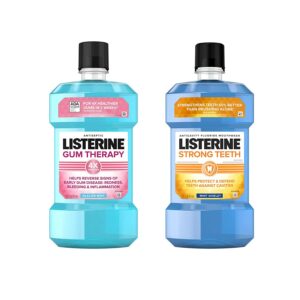
Best Mouthwash for Sensitivity
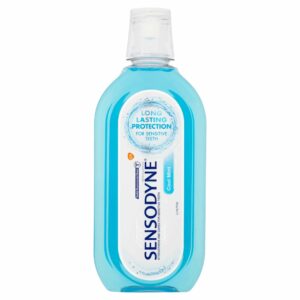
Best Mouthwash for Bad Breath
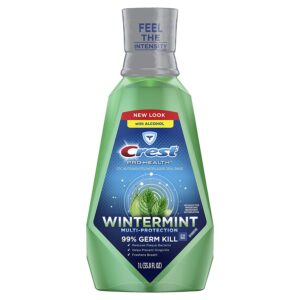
Best Mouthwash for Cavities
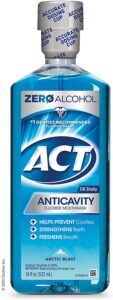
Best Alcohol-Free Mouthwash
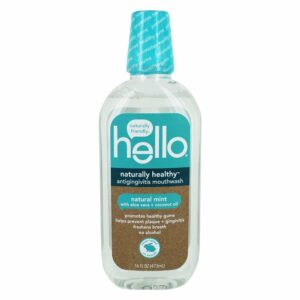
The truth is: there are simply too many mouthwash options on the market today. Walk down the oral health aisle at the drugstore and you’re met with countless different brands, flavors and promises. Whether you’re a mouthwash regular or you’re adding it to your routine for the first time, it can be overwhelming to figure out exactly which mouthwash is right for you.
But before we could recommend the right mouthwash for you, let’s first address some of your oral health concerns. Your current oral health will play a huge part in deciding which mouthwash will be best for you and your needs.
Bad Breath
Halitosis, more commonly known as bad breath, can be mild, severe or downright embarrassing. Oftentimes, severe halitosis can signal more serious health issues. Knowing how bad your breath is (real talk) can help you figure out what kind of mouthwash you want. If you have mild halitosis, usually after eating some smelly foods like garlic and onions, and just want to mask the smell, you can get away with using a cosmetic mouthwash. However, if bad breath is a regular issue, it can be a sign of excessive bacteria, or other oral health problems like gum disease or gingivitis, and you’ll want to use an antibacterial mouthwash and talk with your dentist to figure out what’s happening.
Gingivitis and Gum Disease
Whether you suffer from gingivitis, you’re at risk or you’re working to prevent it, you’ll want to use a mouthwash that has antibacterial, antimicrobial, antiplaque or anti-gingivitis ingredients. Your dentist might even recommend a stronger mouthwash containing chlorhexidine to kill the bacteria and will help to restore your oral health!
Dry Mouth
Unless you suffer from dry mouth, you won’t know just how frustrating of a feeling it is. Luckily, there are mouthwashes that can help! The main thing to note is that you want to avoid mouthwashes that contain alcohol in them, as it’ll dry your mouth out further and in turn, only make your condition and discomfort worse.
Sensitivity
Those who experience tooth sensitivity understand how painful and uncomfortable it truly is, but there are mouthwashes that will help to strengthen your teeth and lessen (or even relieve!) tooth sensitivity. You want to look for products that contain potassium nitrate, potassium citrate, calcium phosphate, sodium fluoride and stannous fluoride. The potassiums citrate and nitrate help to numb the dentin and nerves within your teeth, while the calcium phosphate and sodium and stannous fluorides help to strengthen the teeth, and protect the dentin from harmful irritants.
Do I really need to use mouthwash?
Let’s start with the obvious: using mouthwash does NOT replace the need to brush your teeth and floss. But, using mouthwash can add to your oral hygiene. It leaves your mouth with a fresh and clean feeling, ensuring that your breath is fresh (and depending on the mouthwash you use, even minty!) after use. But it’s not just about smelling good.
Mouthwash helps to reduce the bacteria in your mouth, in turn reducing dental plaque forming on and around your teeth. Combined with brushing your teeth twice a day, and daily flossing, using mouthwash regularly can help prevent periodontal disease and even reduce the likelihood of cavities. And if you suffer with one of the conditions listed above, like bad breath or dry mouth, mouthwash can be an essential part of your oral health routine.
How do I properly use mouthwash?
Did you know there’s a right and wrong way to use mouthwash? It’s true. While we thought it was foolproof (gulp, gargle, spit), there’s actually more of a routine than we even knew.
Mouthwash is best used after you’ve cleaned your mouth thoroughly, by brushing your teeth and flossing. One important thing to note is that if you use a toothpaste that contains fluoride, you’ll want to wait 30 minutes before using mouthwash, as the NHS warns that it will wash away all the concentration of fluoride left by the toothpaste that’s helping your teeth.
If your toothpaste doesn’t contain fluoride, you’re good to use mouthwash right away, but you should probably use one that contains fluoride to make up for the lack of it in your toothpaste.
Follow the product’s recommended amount for use, and then swish vigorously, trying to move the liquid between your teeth as much as you can. You’ll want to swish and gargle for a minimum of 30 seconds.
After using a fluoride mouthwash, you should avoid eating, drinking or smoking for at least 30 minutes to prevent washing away the fluoride. And, most importantly, ensure you never ingest large amounts of mouthwash, as it’s not meant to be swallowed and can be toxic.
Best Mouthwash for Gum Health

If your priority is reversing any signs of early gum disease, treating redness, bleeding and inflammation of the gums, then this is the mouthwash for you! This antiplaque mouthwash is specifically designed to give you 4x healthier gums in just three weeks, compared to brushing alone.
This specialized gum care mouthwash cleans below the gumline, into the hard-to-reach places missed with brushing and flossing. With a glacier mint flavor, the Listerine Gum Therapy Anti-Plaque and Anti-Gingivitis Mouthwash also freshens breath and cleans your mouth, to give you that crisp, cleansed feeling.
Plus, Listerine is still the #1 recommended mouthwash brand by dentists and hygienists, so your teeth, gums and mouth are in good hands and protected by the very best!
Best Mouthwash for Sensitivity

When it comes to sensitivity, you need a mouthwash specifically designed and catered to strengthen and relieve the pain associated with sensitive teeth. Fluoride dental mouthwash, like Sensodyne’s Cool Mint Mouthwash, helps to remineralise your tooth enamel, strengthen teeth, prevent cavities and in turn, relieve tooth sensitivity over time.
Sensodyne’s made-for-sensitive-teeth mouthwash offers long-lasting sensitivity protection. It uses potassium nitrate to anesthetize the nerves within your teeth to reduce pain, and sodium fluoride to help strengthen the teeth to prevent future sensitivity. Plus, the mint flavor leaves your breath feeling fresh and your mouth feeling clean, masking any bad breath on a daily basis.
If sensitivity is what you need your mouthwash to help you with, Sensodyne is the best option, and there are more than 1300 positive reviews to prove it!
Best Mouthwash for Bad Breath

When it comes to breath, all we want is invigoratingly clean. Bad breath is a no-no, and whether we ate a little too much garlic at lunch, or we’re suffering with halitosis daily, we need a strong mouthwash to counteract it. Enter the Crest Pro-Health Invigorating Clean mouthwash.
With six benefits in one, this mouthwash does way more than just freshen your breath. In fact, it also kills germs, reduces plaque, helps prevent gingivitis, keeps teeth cleaner longer and leaves an invigorating sensation behind too! For all-round protection and the freshest breath, you won’t find a better mouthwash.
Best Mouthwash for Cavities

If you’re prone to cavities, know you eat lots of sweet stuff, or just want to ensure you’re cavity free for many more years, then an AntiCavity mouthwash is the key. The ACT AntiCavity mouthwash is an alcohol-free mouthwash (those with dry mouth rejoice!) made with fluoride, designed to help prevent cavities, strengthen your teeth and freshen breath.
The fluoride formula helps to prevent tooth decay by fighting the plaque that creates the holes, essentially preventing cavities long before they have the chance to form. Plus, it’s available in three flavors – Arctic Blast, Iced Berry and Iced Sweet Mint – so that the whole family, even kids once they’re older than six, can enjoy using mouthwash daily!
Best Alcohol-Free Mouthwash

Those who suffer with dry mouth for one reason or another shouldn’t use any regular mouthwash. In fact, regular mouthwashes are probably exacerbating the problem as the alcohol in the ingredients dries out your mouth even more. That being said, an alcohol-free mouthwash is a must if you have a dry mouth.
Hello Naturally Healthy is a natural, antigingivitis mouthwash that contains zero alcohol so it won’t dry out your mouth, but still helps to prevent plaque and gingivitis and give your mouth the oral care it deserves. In a ‘natural mint’ flavor, containing aloe vera and coconut oil, this mouthwash also freshens breath in the way that we want our mouthwash to do, and still tastes awesome!
The winner of STAR Magazine’s 2018 A-List Beauty Award, this mouthwash contains no artificial sweeteners, no artificial flavors, no dyes and no sulfates, and is 100% vegan. Plus, this product is Leaping Bunny certified and never tested on animals, so you can gargle guiltlessly!
FAQs about Best Mouthwash
You may have some questions when selecting the best walking shoes for you. Refer to these common queries below:
Do I need to floss if I use mouthwash?
It’s worth repeating: using mouthwash does NOT mean you don’t have to brush your teeth and floss regularly. In fact, dentists recommend that you brush your teeth properly at least twice a day, and floss every single day. Mouthwash is just that something extra on top of your current routine to help with your oral health goals and help to freshen breath.
What kind of mouthwash should I use?
We recommend reading above and figuring out if you suffer from any of the common oral health conditions, like halitosis, dry mouth or gingivitis, among others. This will help you figure out what your mouthwash should help treat.
Have no specific condition you’d like to work on? Get a multi-purpose mouthwash to help you prevent tooth decay, gingivitis, plaque and freshen breath all at once. It never hurts to be extra prepared!
How often should you use mouthwash?
While mouthwash isn’t a necessary part of your oral hygiene routine, dentists recommend using mouthwash twice a day every day, just like brushing your teeth, in order to see results and improvements from the product.
At the end of the day, brushing and flossing your teeth are still the most important parts of your oral healthcare, and that should be prioritized over a 30-second rinse.

